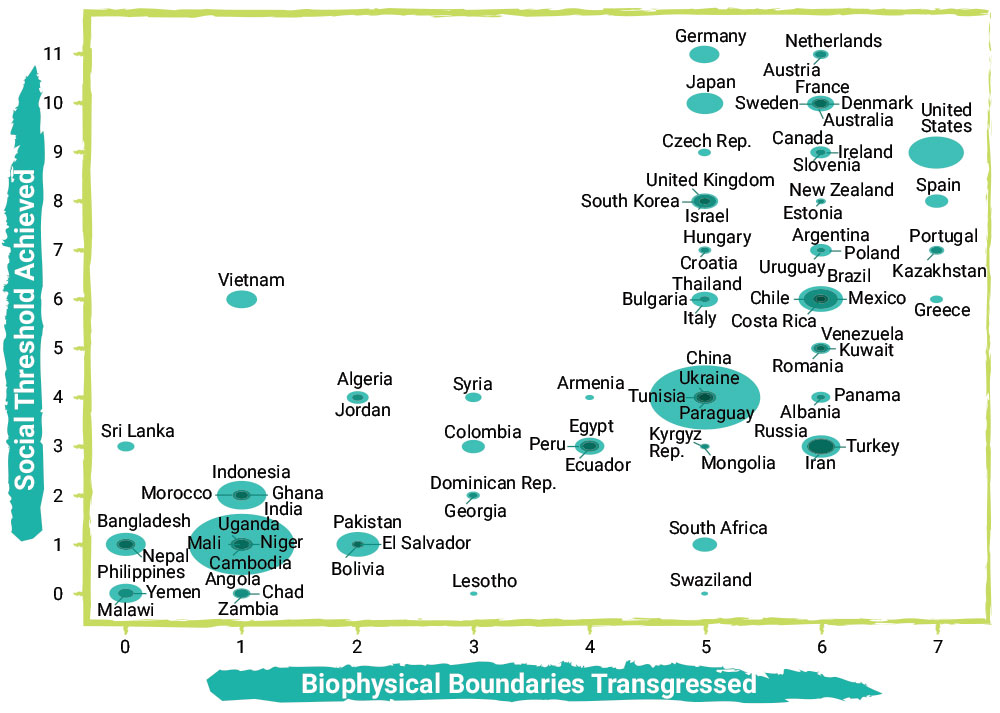We will not realise the dream of a world in which all people enjoy a ‘better and more sustainable future’ as outlined by the United Nations’ Sustainable Development Goals (SDGs) unless we quickly improve our relationship with the Earth, including making our production and consumption patterns sustainable.
About 60% of the natural systems that regulate the climate, provide clean air and water, and sustain food, fibre and animal feed production are degraded or lost.1 Our modern and highly inefficient food systems generate significant volumes of food waste.2 One hundred gigatons of new material goes into the global economy each year – of which only 8,6 gigatons are recycled.4 And the global economic system is still powered by fossil resources that drive climate change, air pollution and biodiversity loss.
This degradation of the environment does not equate to a better quality of life for all. About 1,3 billion people live in multidimensional poverty out of which 803 million live in a household where someone is undernourished and 687 million lack electricity.4
The graph alongside5 illustrates the status of selected countries’ achievements against social indicators and transgression of biophysical boundaries. In a sustainable world, all countries would be in the top left hand side corner of the figure.We, the contributors to this Anthology, have worked together to understand the concept of sustainable consumption and production in our varied contexts. On our own and through partnerships, we help build ‘Sharing Communities’ characterised by a spirit of collaborative action that generates social benefits while reducing impacts on the planet.
The contributions in this Anthology represent the views of the organisations themselves and are drawn from both the Global North and South. It is hoped that they illustrate the need for a sustainability transition to encompass diverse perspectives and that they emphasise the urgency with which we need to act to bring a better world for all into being.
Supportive policy framework
There is often a lack of integrated policy frameworks and lack of knowledge in institutional structures of cross-cutting issues. The contributions by Consumer Unity Trust Society (CUTS) from India, SAFCEI from South Africa and IDEC from Brazil highlight the need for innovative, cross-disciplinary policy formulation designed to generate social and ecological justice.
Known barriers to sustainable consumption are lifestyle habits and a lack of access to sustainably produced goods and to credible, relevant information. People do not, however, always make sustainable choices even when they know that they should. In its contribution, Consumers International stresses the importance of making sustainability the ‘easy option’.
Education plays a key role in raising awareness of the need for sustainable lifestyles and in developing the skills required to address the challenges. Centro Ecológico from Brazil and IBON Foundation from the Philippines illustrate transformative educational approaches that work to build equitable systems that are value‑led and that build collective consumer agency.
Culture can be understood as distinctive collective perceptions of the world that shape individual and community norms of social behaviour, including values and lifestyles. The contributions by Sustaining the Wild Coast in South Africa and IBON International Foundation Inc. in the Philippines illustrate the need to assert the rights of traditional peoples and share their sustainability knowledge and community‑level innovations.
There is a need to bring individuals into active engagement with issues of sustainable consumption to encourage self-initiated action that goes beyond the sphere of private consumption to include civic action. The contribution by SSNC describes how a seemingly simple activity like clothes-swapping can be an entry point to a deeper transformation of values and norms as a space for co-creation of a new future.
- International Union for Conservation of Nature (IUCN). n.d. ‘The IUCN Red List of Threatened Species.’ [Online] Available: https://www.iucnredlist.org.
- Action against Hunger. 2021. ‘World hunger statistics.’ [Online] Available:
https://www.actionagainsthunger.org/world-hunger-facts-statistics. - Circle Economy. 2021. ‘Circularity Gap Report 2021.’ Amsterdam: Circle Economy.
- United Nations Development Programme and Oxford Poverty and Human
Development Initiative. 2020. ‘Global Multidimensional Poverty Index 2020’ [Online]
http://hdr.undp.org/sites/default/files/2020_mpi_report_en.pdf. - O’Neill, D.W., Fanning, A.L., Lamb, W.F. & Steinberger, J.K. 2018. A good life for all within planetary boundaries. ‘Nature Sustainability’ 1:88-95.
